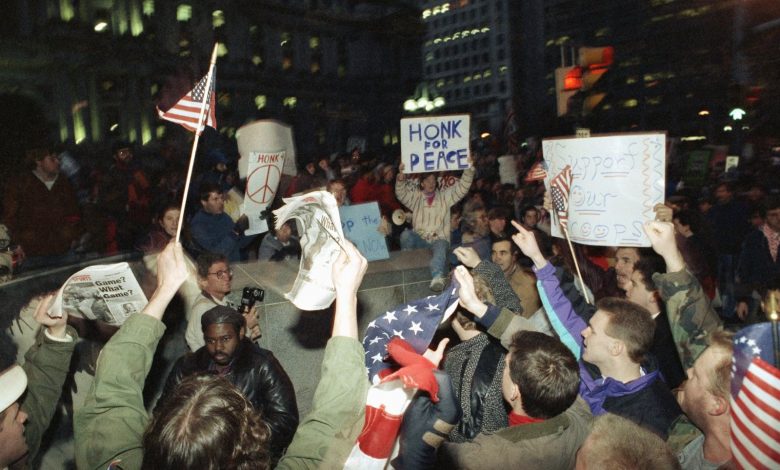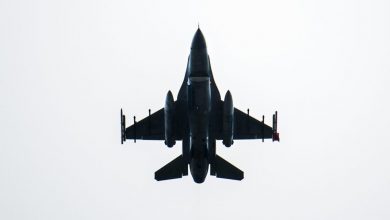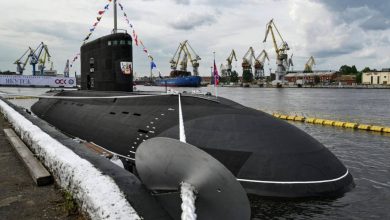Analysis: Neo-cons hijacked the Gulf War for a world war

We can see the neo-conservatives pivotal role in hijacking the Gulf War for a Middle East redesign project, with U.S. forces currently present in Iraq and 30% of Syria being declared an autonomous region controlled by the PKK
Twenty years ago, the six-day-long Battle of Baghdad started. Thirty days later, then U.S. President George W. Bush declared the “end of combat operations” in his “Mission Accomplished” speech and promised the United States’ military forces would leave Iraq.
Today, U.S. forces still remain in Iraq, and with the assurances of incumbent Prime Minister Mohammed S. Al Sudani, they are likely to stay for a long time to come. They were there not to prevent the mass destruction that former Iraqi President Saddam Hussein was promising with his nuclear and chemical weapons as then-President Bush and the U.K. Premier Tony Blair claimed; they invaded Iraq to launch the Wilsonian plan to redesign the Middle East.
Faced with economic difficulties in the aftermath of the Iran-Iraq War, ousted Iraqi leader Saddam Hussein invaded Kuwait, an oil-rich country on Iraq’s southern border in August 1990; and U.S. President George H. W. Bush (the father of George W. Bush), fearing Saddam would attack Saudi Arabia or Israel, assembled a multi-national coalition and with the blessings of the U.N. Security Council, swiftly evicted Iraqi forces from Kuwait. The U.N. established a peacekeeping force in a demilitarized zone between Kuwait and Iraq. The U.S., Britain and France committed soldiers, Germany, Japan, South Korea, Saudi Arabia and the United Arab Emirates provided financial support, and the last Soviet president Mikhail Gorbachev’s Russia morally backing the operation liberated Kuwait and stopped Saddam’s bombing Israel and secured the “free flow of oil.”
If Kuwait did not account for 20% (and Saudi Arabia another 26%) of the world’s oil supply, would these countries bat an eyelash after Saddam’s Kuwait invasion?
As Immanuel Kant says, you shouldn’t ask rhetorical questions about history.
But more than a decade later, the younger Bush, claiming that Saddam had “infringed the U.N. peacekeeping resolution obstructing diplomacy and implementing brutal internal politics,” decided to put together another international coalition.
End of history?
Remember, in those 10 years since the Gulf War, American political scientist Francis Fukuyama had announced that history had ended, and liberal democracy was going to be a permanent regime in the world; Russia was freed from communism; the incumbent U.S. had more urging business like having affairs in the Oval Office, so the world was paying little attention to what kind of policy team the new President Bush had gathered around him until he declared that the U.S. had to invade Iraq and the world yet again to help them. That Saddam’s presence was a slap in the face of the global jubilation of the liberal democracy and that he might be back in the old game of invading neighbors or that he was irritating the Shiite or Kurdish minorities in his country were not convincing enough, Bush could get help only from the British, Australia and Poland. Despite the fact that this time the U.N. was not willing to sanction the U.S. invasion, Bush had started the invasion with 130,000 U.S. troops, and about 45,000 British soldiers (in addition to 2,000 soldiers from Australia and 194 Polish soldiers).
Even though John O’Sullivan, a senior fellow at the National Review Institute and an editor-at-large of National Review, rejects the argument that the Iraq War was a neo-conservative hijacking of foreign policy, he accepts that such neo-conservatives as Robert Kagan and Paul Wolfowitz were in a position to “play a distinctive part in the debate.”
“(The neo-conservatives) had energy, expertise, standing in the foreign-policy establishment, and a fully thought-out theory of what they could and would achieve,” Sullivan writes.
Who were they? And what were they trying to achieve?
First term of Bush: Incubation period of Neo-con
Bush’s first term should be remembered as the incubation period of neo-conservatism in the U.S.
It began during the 1960s among democrats and other liberals who rejected the pacifist foreign policy of the Democratic Party. Still, prominent doves-turned-hawks found the fertile soil when Bush the Son ended up at the White House with no idea about what to do. He got elected running on his father’s coattails; he himself was a good-for-nothing, as The Washington Post had called, a “So-So Student but a Campus Mover.”
Faced with economic difficulties in the aftermath of the Iran-Iraq War, ousted Iraqi leader Saddam Hussein invaded Kuwait, an oil-rich country on Iraq’s southern border in August 1990; and U.S. President George H. W. Bush (the father of George W. Bush), fearing Saddam would attack Saudi Arabia or Israel, assembled a multi-national coalition and with the blessings of the U.N. Security Council, swiftly evicted Iraqi forces from Kuwait. The U.N. established a peacekeeping force in a demilitarized zone between Kuwait and Iraq. The U.S., Britain and France committed soldiers, Germany, Japan, South Korea, Saudi Arabia and the United Arab Emirates provided financial support, and the last Soviet president Mikhail Gorbachev’s Russia morally backing the operation liberated Kuwait and stopped Saddam’s bombing Israel and secured the “free flow of oil.”
If Kuwait did not account for 20% (and Saudi Arabia another 26%) of the world’s oil supply, would these countries bat an eyelash after Saddam’s Kuwait invasion?
As Immanuel Kant says, you shouldn’t ask rhetorical questions about history.
But more than a decade later, the younger Bush, claiming that Saddam had “infringed the U.N. peacekeeping resolution obstructing diplomacy and implementing brutal internal politics,” decided to put together another international coalition.
End of history?
Remember, in those 10 years since the Gulf War, American political scientist Francis Fukuyama had announced that history had ended, and liberal democracy was going to be a permanent regime in the world; Russia was freed from communism; the incumbent U.S. had more urging business like having affairs in the Oval Office, so the world was paying little attention to what kind of policy team the new President Bush had gathered around him until he declared that the U.S. had to invade Iraq and the world yet again to help them. That Saddam’s presence was a slap in the face of the global jubilation of the liberal democracy and that he might be back in the old game of invading neighbors or that he was irritating the Shiite or Kurdish minorities in his country were not convincing enough, Bush could get help only from the British, Australia and Poland. Despite the fact that this time the U.N. was not willing to sanction the U.S. invasion, Bush had started the invasion with 130,000 U.S. troops, and about 45,000 British soldiers (in addition to 2,000 soldiers from Australia and 194 Polish soldiers).
Even though John O’Sullivan, a senior fellow at the National Review Institute and an editor-at-large of National Review, rejects the argument that the Iraq War was a neo-conservative hijacking of foreign policy, he accepts that such neo-conservatives as Robert Kagan and Paul Wolfowitz were in a position to “play a distinctive part in the debate.”
“(The neo-conservatives) had energy, expertise, standing in the foreign-policy establishment, and a fully thought-out theory of what they could and would achieve,” Sullivan writes.
Who were they? And what were they trying to achieve?
First term of Bush: Incubation period of Neo-con
Bush’s first term should be remembered as the incubation period of neo-conservatism in the U.S.
It began during the 1960s among democrats and other liberals who rejected the pacifist foreign policy of the Democratic Party. Still, prominent doves-turned-hawks found the fertile soil when Bush the Son ended up at the White House with no idea about what to do. He got elected running on his father’s coattails; he himself was a good-for-nothing, as The Washington Post had called, a “So-So Student but a Campus Mover.”
No wonder, 20 years later the Gulf War still rages on!
Source: DailySabah / Hakkı Ocal





